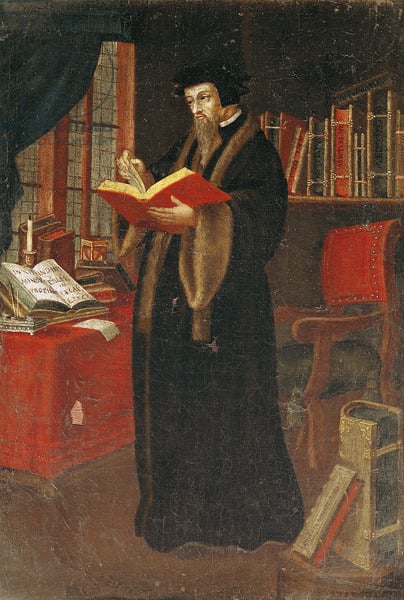
John Calvin’s words will be in blue.
I’ve written several times about the extreme intolerance of the early Protestant leader John Calvin (1509-1564). Protestants (usually only dimly acquainted with the history of the matter and according to received tradition), are accustomed to think that Calvin had a mere lapse regarding the execution of anti-trinitarian heretic Michael Servetus on 27 October 1553, as if this were an “embarrassing” exception to the rule of his usual thinking. Nothing could be further from the truth. I’ve written several times about this general topic:
Calvin the “Destroyer” of Servetus: James Swan Misses Forest for Trees [8-24-17]
John Calvin Mocked Servetus’ Reaction to His Death Sentence [3-25-10]
Calvin Supports Death Penalty for Heresy After Servetus [11-6-11]
I ran across another related document in the two-volume set, which I have in hardcover in my own library, Toleration and the Reformation (Joseph Lecler, S.J., New York: Association Press, 1960, from the 1955 French edition; translated by T. L. Westow). It was published in January 1554, within three months of Servetus’ execution by burning; largely as a result of criticisms received for his advocacy of that event. It’s called Declaratio orthodoxae fidei (Latin text: Calvini Opera, t. VIII, pp. 453-644].
The book is available for free in Latin, online [link one / link two/ link three / link four]. Post-Reformation Digital Library contains links to it on its John Calvin page. The work had never seemingly been translated into English until literally twenty-five days before this writing (14 May 2025), and even that is merely a self-published effort, using AI. I may eventually get to work, myself, and translate portions of it, using Google Translate. This is an important part of 16th century Protestant history that ought to be known. Truth is truth, and facts are facts.
No Reformed / Calvinist — or any sort of Protestant — publisher had seen fit to translate the Declaratio into English, these past 471 years. Yet so many times, Protestants will object when I simply note that their own folks have often sought to conceal unsavory aspects of their past history (while exercising a double standard in constantly and loudly proclaiming similar Catholic “skeletons.”
This was also true of the 55-volume Luther’s Works in English, which decided not to include several of Luther’s more controversial treatises or letters — some of which I have been citing from other sources since 1990. To their credit, the editors of that set have, in recent years, decided to greatly expand it, in order to reflect the scope of the much larger German Weimar edition of 1883. It is now up to at least 79 volumes.
Fr. Lecler describes Declaratio orthodoxae fidei as “one of the most frightening treatises ever written to justify the persecution of heretics” (Lecler, Vol. 1, 333). Then he cites Calvin, from the 1554 French edition of this work (I will cite those page numbers hereafter):
Our sympathy-mongers, who take such great pleasure in leaving heresies unpunished, now see that their fantasy hardly conforms with God’s commandment. Afraid lest the Church be blamed for being too severe, they would allow all kinds of errors to spread freely to secure tolerance for one man. But God does not even allow whole towns and populations to be spared, but will have the walls razed and the memory of the inhabitants destroyed and all things frustrated as a sign of his utter detestation, lest the contagion spread. He even gives us to understand that by concealing a crime one becomes an accomplice. Nor is this to be wondered at, since it is here a question of rejecting God and sane doctrine, which perverts and violates every human and divine right. (Lecler, Vol. 1, 333; Declaratio, 47-48; see Deut 13:12-18)
Calvin continues:
Though I admit that the princes have no power to penetrate the human heart with their edicts and to move them so that they submit to God and conform with the truth, their vocation compels them nevertheless not to tolerate that God’s name be reviled, and evil and venomous tongues tear his sacred word to pieces. . . .
That humanity, advocated by those who are in favour of a pardon for heretics, is greater cruelty because in order to save the wolves they expose the poor sheep. I ask you, is it reasonable that heretics should be allowed to murder souls and to poison them with their false doctrine, and that we should prevent the sword, contrary to God’s commandment, from touching their bodies, and that the whole Body of Jesus Chris be lacerated that the stench of one rotten member may remain undisturbed? (Lecler, Vol. 1, 334; Declaratio, 32, 35-36)
This was the same rationale, of course, as that of the Inquisition, defended by St. Thomas Aquinas and many others. But Calvin’s thinking (paraphrased by Lecler) was that ” ‘papists’ do not have the same right to persecute Protestants, since they follow a false doctrine!” (Vol. 1, 334). Hence, Calvin wrote:
The swords of persecutors cannot prevent good and faithful magistrates from applying the rod of justice for the sake of the Church, formerly applied unjustly; and the tortures, suffered by the martyrs, cannot be an obstacle to the protection which good princes bestow on the children of God. (Lecler, Vol. 1, 335; Declaratio, 21)
Ah, so we are to believe that Calvin advocated capital punishment, but not “cruel and unusual” punishment and torture leading up to it? He certainly didn’t act in accord with this sublime ideal. Regarding the Comparet brothers in Geneva in 1555, thought to be guilty of some sort of conspiracy against the government, Non-Catholic Calvin biographer Hugh Young Reyburn wrote:
One of the two men, Comparet, who had been arrested, was condemned on 27 June [1555] to have his head cut off, his body quartered, and the sections exposed in different places according to custom. His head with one quarter of his body was fastened to the gibbet referred to. . . . the younger Comparet was simply beheaded. The executioner did his work so clumsily that he added needless pangs to the victim’s agony, and the Council punished him by dismissing him from his office for a year and a day. Calvin, on the other hand, wrote to Farel on 24 July, “I am persuaded that it is not without the special will of God that, apart from any verdict of the judges, the criminals have endured protracted torment at the hands of the executioner.” [Opera, xv. 693; cf. xxi. 610] . . .
It was determined to get the truth out of him [Francois Daniel], and Calvin wrote to Farel on 24 July [Opera, xv. 693; cf. Letters of John Calvin (Phila.), Vol. 3, 206], “We shall see in a couple of days, I hope, what the torture will wring from him.” . . .
Although he was neither consulted as to the torture, nor was present when it was applied, Calvin certainly approved of it. . . .
It is unfortunate for Calvin’s reputation that he should have thought the use of torture justifiable under any circumstances, and it is still more unfortunate that he commended the use of it to prove that which was evident. . . . All that was proved was a sudden flare-up on the street created by the reckless folly of some half-intoxicated Libertines. Nevertheless, the Council acted as if the rioters had been the agents of a carefully-laid scheme of revolution.
These atrocious incidents of Calvin enthusiastically approving torture occurred just a year-and-a-half after he stated that he was opposed to torture, in his Declaratio orthodoxae fidei.
Unsurprisingly, I couldn’t find the Declaratio orthodoxae fidei listed in a supposed “Complete Works Of John Calvin” listed at godrules.net. Nor did Christian Classics Ethereal Library, which has 55 works of Calvin listed, see fit to include it. But the famous 19th century Protestant Church historian, Philip Schaff, made mention of it in his History of the Church, Vol. 8, § 157. Calvin’s Defence of the Death Penalty for Heretics. He stated:
The public sentiment, Catholic and Protestant, as we have seen, approved of the traditional doctrine, that obstinate heretics should be made harmless by death, and continued unchanged down to the close of the seventeenth century. . . .
Not only dissenters and personal enemies, but also, as Beza admits, some orthodox and pious people and friends of Calvin were dissatisfied with the severity of the punishment, and feared, not without reason, that it would justify and encourage the Romanists in their cruel persecution of Protestants in France and elsewhere.
Under these circumstances Calvin felt it to be his disagreeable duty to defend his conduct, and to refute the errors of Servetus. He was urged by Bullinger to do it. He completed the work in a few months and published it in Latin and French in the beginning of 1554. It had an official character and was signed by all the fifteen ministers of Geneva.
Beza aided him in this controversy and undertook to refute the pamphlet of Bellius, and did so with great ability and eloquence.
Calvin’s work against Servetus gave complete satisfaction to Melanchthon. It is the strongest refutation of the errors of his opponent which his age produced, but it is not free from bitterness against one who, at last, had humbly asked his pardon, and who had been sent to the judgment seat of God by a violent death. It is impossible to read without pain the following passage:
Whoever shall now contend that it is unjust to put heretics and blasphemers to death will knowingly and willingly incur their very guilt. This is not laid down on human authority; it is God who speaks and prescribes a perpetual rule for his Church. It is not in vain that he banishes all those human affections which soften our hearts; that he commands paternal love and all the benevolent feelings between brothers, relations, and friends to cease; in a word, that he almost deprives men of their nature in order that nothing may hinder their holy zeal. Why is so implacable a severity exacted but that we may know that God is defrauded of his honor, unless the piety that is due to him be preferred to all human duties, and that when his glory is to be asserted, humanity must be almost obliterated from our memories? . . .
Calvin’s “Defence” did not altogether satisfy even some of his best friends. Zurkinden, the State Secretary of Bern, wrote him Feb. 10, 1554: “I wish the former part of your book, respecting the right which the magistrates may have to use the sword in coercing heretics, had not appeared in your name, but in that of your council, which might have been left to defend its own act. I do not see how you can find any favor with men of sedate mind in being the first formally to treat this subject, which is a hateful one to almost all.” Bullinger intimated his objections more mildly in a letter of March 26, 1554, in which he says: “I only fear that your book will not be so acceptable to many of the more simple-minded persons, who, nevertheless, are attached both to yourself and to the truth, by reason of its brevity and consequent obscurity, and the weightiness of the subject. . . .”
The Dutch Protestant martyrology mentions 877 names for the sixteenth century, of which 617, or about two-thirds, were Anabaptists. Similar proportions would probably be found for Switzerland and the countries of central Europe, where the persecution was equally severe. (Vol. 1, 209; see Henri Pirenne, Histoire de Belgique , t. III, p. 362, n. 3, based on the Bibliographie des martyrologes protestants neerlandais, Ghent, 1890)
Photo Credit: Portrait of John Calvin (French school, 16th century) [public domain / Wikimedia Commons]
Summary: I summarize John Calvin’s treatise from Jan. 1554, entitled Declaratio orthodoxae fidei [Declaration of the Orthodox Faith], in which he defends the duty of executing heretics.












